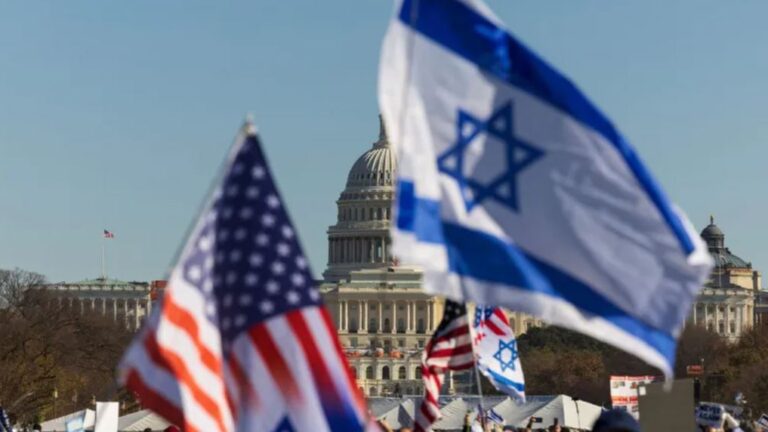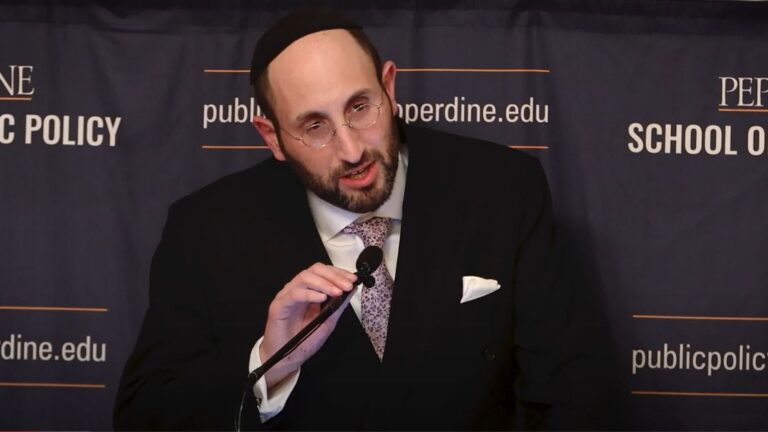When it comes to religion in public life, today Americans are generally taught to focus on the “separation of church and state.” This, however, is only one part of the nation’s religious story, and to focus exclusively on it misses the crucial contributions that religious belief and religious believers—including Judaism and Jewish Americans—have made to America and its founding.
In 2017, in a speech criticizing those who would invoke religion as a barrier to government office, Sen. Mike Lee invoked Jonas Phillips, “a penniless Jewish immigrant, an indentured servant, a hard-working businessman, and an American patriot who served in the Philadelphia Militia during the Revolutionary War,” who urged George Washington and the leaders of the American government not to allow religious tests for public office.
Many years after Phillips’s successful plea, Phillips’s grandson, Uriah Levy, purchased Monticello from Thomas Jefferson’s descendants, helping to preserve this part of America’s founding heritage—an account recalled by Rabbi Soloveichik in an op-ed for the Wall Street Journal, and in his online course “Jewish Ideas and the American Founders.”
In this conversation, Rabbi Soloveichik sits down with Senator Lee and Adam White, a Hoover Institution research fellow, for a discussion about the proper relationship between religion and America’s government, and the contributions that biblical ideas have made to American political thought.
This conversation took place on Wednesday, February 14, 2018.
Explore More

What Jews Mean to America, with Rabbi Meir Soloveichik and Jay Nordlinger
Rabbi Soloveichik sits down with NR senior editor Jay Nordlinger to discuss his tentpole essay, "What Jews Mean to America."

On Making Men Moral, 30 Years Later, and Professor Robert George
Rabbi Soloveichik discusses an essential but forgotten work, and the influence of one of his greatest teachers.
When it comes to religion in public life, today Americans are generally taught to focus on the “separation of church and state.” This, however, is only one part of the nation’s religious story, and to focus exclusively on it misses the crucial contributions that religious belief and religious believers—including Judaism and Jewish Americans—have made to America and its founding.
In 2017, in a speech criticizing those who would invoke religion as a barrier to government office, Sen. Mike Lee invoked Jonas Phillips, “a penniless Jewish immigrant, an indentured servant, a hard-working businessman, and an American patriot who served in the Philadelphia Militia during the Revolutionary War,” who urged George Washington and the leaders of the American government not to allow religious tests for public office.
Many years after Phillips’s successful plea, Phillips’s grandson, Uriah Levy, purchased Monticello from Thomas Jefferson’s descendants, helping to preserve this part of America’s founding heritage—an account recalled by Rabbi Soloveichik in an op-ed for the Wall Street Journal, and in his online course “Jewish Ideas and the American Founders.”
In this conversation, Rabbi Soloveichik sits down with Senator Lee and Adam White, a Hoover Institution research fellow, for a discussion about the proper relationship between religion and America’s government, and the contributions that biblical ideas have made to American political thought.
This conversation took place on Wednesday, February 14, 2018.
Explore More

What Jews Mean to America, with Rabbi Meir Soloveichik and Jay Nordlinger
Rabbi Soloveichik sits down with NR senior editor Jay Nordlinger to discuss his tentpole essay, "What Jews Mean to America."

On Making Men Moral, 30 Years Later, and Professor Robert George
Rabbi Soloveichik discusses an essential but forgotten work, and the influence of one of his greatest teachers.
When it comes to religion in public life, today Americans are generally taught to focus on the “separation of church and state.” This, however, is only one part of the nation’s religious story, and to focus exclusively on it misses the crucial contributions that religious belief and religious believers—including Judaism and Jewish Americans—have made to America and its founding.
In 2017, in a speech criticizing those who would invoke religion as a barrier to government office, Sen. Mike Lee invoked Jonas Phillips, “a penniless Jewish immigrant, an indentured servant, a hard-working businessman, and an American patriot who served in the Philadelphia Militia during the Revolutionary War,” who urged George Washington and the leaders of the American government not to allow religious tests for public office.
Many years after Phillips’s successful plea, Phillips’s grandson, Uriah Levy, purchased Monticello from Thomas Jefferson’s descendants, helping to preserve this part of America’s founding heritage—an account recalled by Rabbi Soloveichik in an op-ed for the Wall Street Journal, and in his online course “Jewish Ideas and the American Founders.”
In this conversation, Rabbi Soloveichik sits down with Senator Lee and Adam White, a Hoover Institution research fellow, for a discussion about the proper relationship between religion and America’s government, and the contributions that biblical ideas have made to American political thought.
This conversation took place on Wednesday, February 14, 2018.
Explore More

What Jews Mean to America, with Rabbi Meir Soloveichik and Jay Nordlinger
Rabbi Soloveichik sits down with NR senior editor Jay Nordlinger to discuss his tentpole essay, "What Jews Mean to America."

On Making Men Moral, 30 Years Later, and Professor Robert George
Rabbi Soloveichik discusses an essential but forgotten work, and the influence of one of his greatest teachers.

